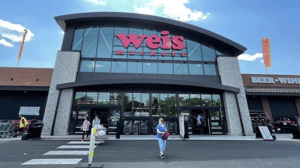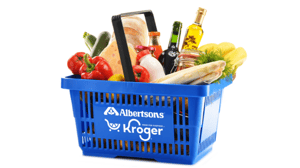HOMELAND SET FOR CHAPTER 11 EXIT; SPENDING PLAN REVEALED
OKLAHOMA CITY -- Homeland Stores here said last week it plans to invest $15 million a year in capital expenditures in each of the next three years as it prepares to emerge from Chapter 11 bankruptcy protection proceedings at the end of the month.James Demme, president and chief executive officer of the 65-unit chain, said the bankruptcy court is scheduled to confirm the company's reorganization plan
July 15, 1996
ELLIOT ZWIEBACH
OKLAHOMA CITY -- Homeland Stores here said last week it plans to invest $15 million a year in capital expenditures in each of the next three years as it prepares to emerge from Chapter 11 bankruptcy protection proceedings at the end of the month.
James Demme, president and chief executive officer of the 65-unit chain, said the bankruptcy court is scheduled to confirm the company's reorganization plan Friday, July 19, with the plan expected to take effect July 29 following a 10-day waiting period for objections. Because all creditors approved the reorganization plan prior to the Chapter 11 filing, Demme said he does not anticipate any objections to the plan. Once the reorganization is implemented, Homeland would become more aggressive in new-store construction, with the annual expenditure of $15 million in each of the next three years generated solely by cash flow, Demme noted. The company had been spending only $5 million a year on cap-ex during the past couple of years to maintain its existing store base, he added. According to Demme, Homeland will completely gut and reopen a store later this year in Amarillo that it acquired several years ago but subsequently closed. He said Homeland plans to open new stores in Oklahoma City and Tulsa next year, with two more new stores in its existing area in 1998 and two more in 1999. The company also intends to continue its store remodeling and upgrading program, which includes adding service seafood and expanding and enhancing the overall perishables selections in its stores, Demme said. The company's emergence from Chapter 11 would also signal completion of an employee buyout offer that Homeland proposed in May. While Demme declined to say how many of the 1,500 senior-rate employees who were eligible for the buyout accepted the offer, he said the company had exceeded its goal of 50%. The buyout will take effect Aug. 4. Demme declined to say how much expenses would be reduced by cutting back on the number of employees. He said Homeland would also mark its emergence from Chapter 11 with a chainwide rollout of its Homeland Savings card, a frequent-shopper card that the chain has been testing at its 17 Texas stores since September. Demme said the company has deemed the card a success there, based on the fact that more than 80% of the residents in the marketing area carry the card. After making some modifications in the program, he said, the card would be introduced chainwide in late summer. He said he is confident that Homeland's emergence from Chapter 11 will be successful "because we continue to maintain the leading market share in Oklahoma City, Tulsa and Amarillo and because we were able to reduce our debt and obtain union concessions before we filed." Homeland was operating 111 stores in early 1995. It sold 29 stores and its locally based distribution center to Associated Wholesale Grocers, Kansas City, Kan., in April 1995, then closed 15 other stores prior to the Chapter 11 filing and two more during the filing, to bring its store base down to 65 units -- 46 in Oklahoma, 17 in Texas and two in Kansas; Demme said he does not expect to close any more stores. He declined to pinpoint the chain's market shares. However, he said that, despite the opening of 23 supercenters in the marketing area since 1990, Homeland has been able to hold the leading share in each of its marketing areas since 1988, when the stores were spun off by Safeway.
About the Author
You May Also Like






